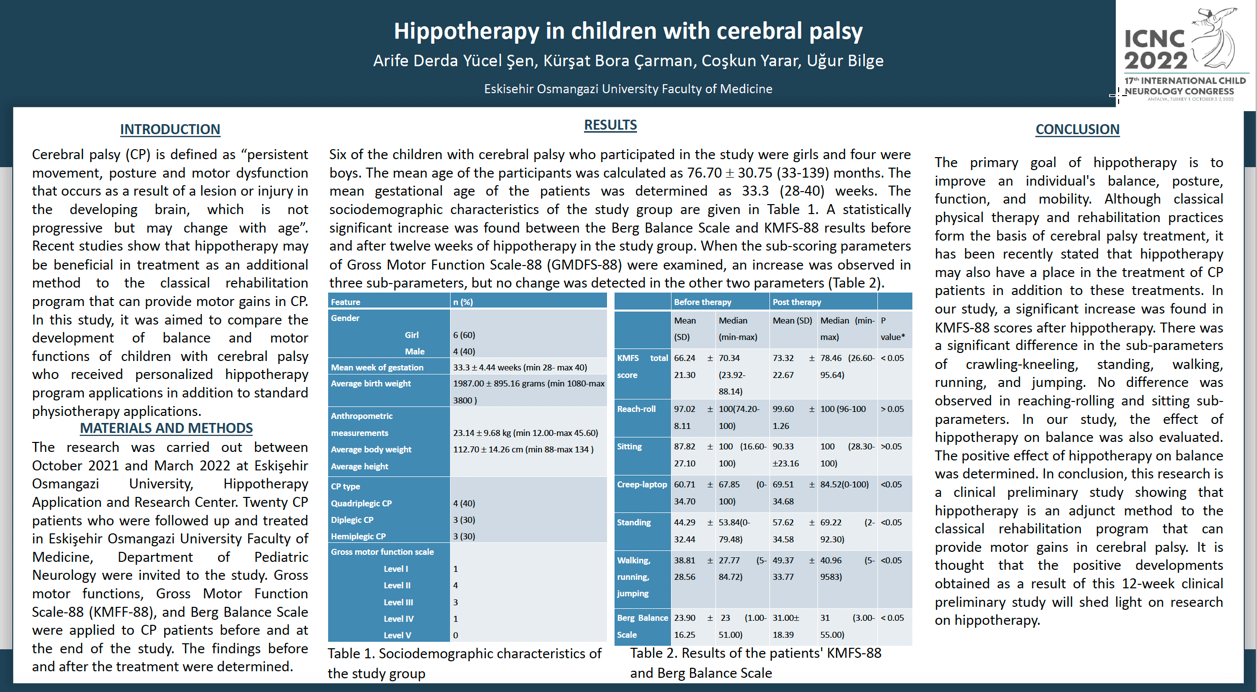Hippotherapy in children with cerebral palsy
Kursat Bora Carman, Ibrahim Serdar Kaçar, Enis Kazim Sezgin, Cafer Yildirim, Sukru Torun, Mina Akbay, Coskun Yarar, Arife Derda Yucel Sen, Mehtap Turkmenoglu, Ugur Bilge
Objectives: This study aimed to assess the influence of hippotherapy (therapy with horses) on gross motor function and balance among children with cerebral palsy (CP). Methods: The study was conducted with ten children with CP. The children from the study groups attended 30min hippotherapy sessions for 12 consecutive weeks, twice. The gross motor function measure scale–88 (GMFM-88) and Berg balance scale were used to measure the effect of hippotherapy. Results: The mean age of children was 76.70 (33-139) months. In four, three, and three children, respectively, the types of CP were bilateral quadriplegia, diplegia, and hemiplegia. The mean scores of GMFM-88 and Berg balance scales were measured as 66.24 ± 21.30 (23.92-88.14) and 23.90 ± 16.25 (1.00-51) at the beginning of the hippotherapy program. After 12 weeks, these values were calculated as 66.69 ±27.11 (26.26-95.64) and 31.00 ± 18.39 (3.00-55.00). Conclusion: Hippotherapy has a positive influence on the balance and gross motor functions in children with cerebral palsy.
Keywords: Cerebral palsy, hippotherapy, children
Kursat Bora Carman
Eskisehir Osmangazi Unversity Faculty of Medicine
Turkey
Ibrahim Serdar Kaçar
Turkey
Enis Kazim Sezgin
Turkey
Cafer Yildirim
Turkey
Sukru Torun
Turkey
Mina Akbay
Turkey
Coskun Yarar
Turkey
Arife Derda Yucel Sen
Turkey
Mehtap Turkmenoglu
Turkey
Ugur Bilge
Turkey
Objectives: This study aimed to assess the influence of hippotherapy (therapy with horses) on gross motor function and balance among children with cerebral palsy (CP). Methods: The study was conducted with ten children with CP. The children from the study groups attended 30min hippotherapy sessions for 12 consecutive weeks, twice. The gross motor function measure scale–88 (GMFM-88) and Berg balance scale were used to measure the effect of hippotherapy. Results: The mean age of children was 76.70 (33-139) months. In four, three, and three children, respectively, the types of CP were bilateral quadriplegia, diplegia, and hemiplegia. The mean scores of GMFM-88 and Berg balance scales were measured as 66.24 ± 21.30 (23.92-88.14) and 23.90 ± 16.25 (1.00-51) at the beginning of the hippotherapy program. After 12 weeks, these values were calculated as 66.69 ±27.11 (26.26-95.64) and 31.00 ± 18.39 (3.00-55.00). Conclusion: Hippotherapy has a positive influence on the balance and gross motor functions in children with cerebral palsy.
Keywords: Cerebral palsy, hippotherapy, children
Kursat Bora Carman
Eskisehir Osmangazi Unversity Faculty of Medicine
Turkey
Ibrahim Serdar Kaçar
Turkey
Enis Kazim Sezgin
Turkey
Cafer Yildirim
Turkey
Sukru Torun
Turkey
Mina Akbay
Turkey
Coskun Yarar
Turkey
Arife Derda Yucel Sen
Turkey
Mehtap Turkmenoglu
Turkey
Ugur Bilge
Turkey

Kursat Bora Carman
Eskisehir Osmangazi Unversity Faculty of Medicine Turkey
Eskisehir Osmangazi Unversity Faculty of Medicine Turkey